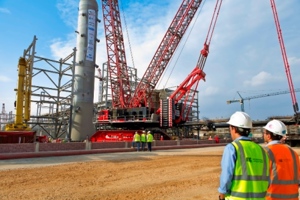Egypt's new refinery will cut fuel import bill
LONDON - Egyptian investment firm Qalaa Holdings is confident its new refinery will cut the country's dependence on crucial oil product imports, particularly as a weaker currency and rising crude prices force the government to reduce its energy bills.
The $3.7-B Egyptian Refining Co. (ERC) will have the capacity to produce 4.2 metric MMtpy of refined products, which ERC will sell to state-controlled Egyptian General Petroleum Corp. (EGPC) at international prices under a 25-year agreement.
Qalaa owns a 19% stake in ERC, which is expected to become operational in the first quarter of 2017.
Egypt, which has turned from a net energy exporter to an importer because of declining domestic production and the burden of costly subsidies, aims to end gasoline and possibly gasoil imports by 2019.
The country is suffering from a shortage of hard currency, and Qalaa chairman Ahmed Heikal said that ERC will be exposed to EGPC's dollar shortages. However, he said there were provisions in the contract that would allow a rolling letter of credit for oil products that cover the three months going forward.
"You have to remember what is the alternative for the government? The alternative is to import. So they will have to pay cash for the products," Heikal said.
Egypt's economy has struggled since the fall of President Hosni Mubarak in 2011 and its tourism industry, a key source of dollar revenues, has faced a string of crises, the latest being last week's EgyptAir plane crash.
ERC will convert 3.5 metric MMt of heavy residue from the refining process at the nearby CORC plant to higher-value products like diesel and gasoline. Heikal said ERC will additionally import 10 MMbpy of crude, with a preference for Saudi Arabia's Arab Medium.
GAS BOOM
Heikal said he is "cautiously optimistic" on the medium-term outlook for the Egyptian economy, especially in light of recent gas discoveries.
Egypt used to produce 96% of its electricity through natural gas, but as a result of the decline in natural gas production, its power stations have had to increase the amount of fuel oil they burn, Heikal said.
Italy's eni made a huge natural gas discovery at the offshore Zohr field last year that is expected to come onstream in 2018, making Egypt self-sufficient in natural gas by 2020.
By that time, ERC would then be able to upgrade any excess fuel oil to higher-quality refined products, Heikal said.
As oil prices more than halved between mid-2014 and early 2016, Egypt's subsidy bill fell sharply, but the recent recovery in prices is weighing on public coffers once again.
Egypt now spends $795 MM/month on imports to meet its energy needs, according to the petroleum ministry.
Heikal said the government would have "no other choice" but to raise subsidies, even if it is at a gradual pace.
(Reporting by Ahmad Ghaddar; editing by Susan Fenton)







Comments